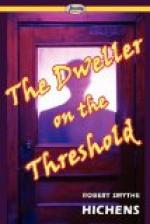Before he could continue, the door opened again, and the tall and powerful form of the rector appeared. And as the outer man of Chichester seemed to Malling to have begun subtly to change, in obedience surely to the change of his inner man, so seemed Mr. Harding a little altered physically, as he now slowly came forward to greet his wife’s two visitors. The power of his physique seemed to be struck at by something within, and to be slightly marred. One saw that largeness can become but a wide surface for the tragic exhibition of weakness. As the rector perceived the presence of Chichester, an expression of startled pain fled over his face and was gone in an instant. He greeted the two men and sat down.
“Have you just begun tea?” he asked, looking now at his wife.
“We are just going to begin it,” she replied. “We are talking about the sermon of last Sunday.”
“Oh,” rejoined the rector.
He turned to Malling.
“Did you come to hear me preach again?”
There was a note as of slight reassurance in his voice.
“Mr. Chichester’s sermon,” said Lady Sophia.
“Oh, I see,” said the rector. He glanced hastily from one to the other of the three people in the room, like a man searching for sympathy or help. “What were you saying about our friend Chichester’s sermon?” he asked, with a forced air of interest.
Lady Sophia distributed cups for tea.
“I was speaking of that part of it which dealt with the man who followed his double,” said Malling.
“Ah?” said the rector.
He was holding his tea-cup. His hand trembled slightly at this moment, and the china rattled. He set the cup down on the small table before him.
“You said,” observed Chichester—toward whom Lady Sophia immediately turned, with an almost rapt air—“that it suggested some curious speculations to your mind. I should very much like to know what they were.”
“One was this. Suppose the man in the garden, who looked in upon his double, had not fled away. Suppose he had had the courage to remain, and, in hiding—for the sake of argument we may assume the situation to be possible—”
“Ah, indeed! And why not?” interrupted Chichester.
His voice, profoundly melancholy, fell like a weight upon those who heard him. And again Malling thought of him almost as some one set apart from his fellows by some mysterious knowledge, some heavy burthen of truth.
“—and in hiding had watched the life of his double. I sat up speculating what effect such an observation, terrible no doubt and grotesque, would be likely to have on the soul of the watching man. But there was another speculation with which I entertained my mind that night.”
“Let us have it,” said Chichester, leaning forward, and, with the gesture characteristic of him, dropping his hands down between his knees. “Let us have it.”
“Suppose the man to remain and, in hiding, to watch the life of his double, what effect would such an observation be likely to have upon the double?”




